I wrote Part 1 of this post on 26/4. Post updated: 07/05 (Election Day). Scroll down for Part 2 of this post, including a description of what I did in class, student feedback, and some chock-full-o’-PARSNIPs #eltwhiteboards.
With the French Presidential Elections less than two weeks away, I thought it was a good time to talk politics in class. Why? I mean, I teach in Italy. Talking about other people’s politics means there may be a big knowledge gap.
But it’s also emotionally easier. And so many of these are the big issues I’ve talked about teaching: immigration, security, terrorism, the future of the EU that are 100% relevant to my students’ lives — even if it’s not the sort of relevance usually granted when the syllabus topics are Cooking, Shopping and Sports.
As the clock is ticking till the event itself, I wanted to throw together some resources and a basic plan that I can use, change and expand upon in 3 classes (1 teens upper-int/advanced, 1 advanced adults, 1 upper-int adults) over the next two weeks.
Here I’ll share the resources and a rough plan. They’re the Big Blocks — don’t take what follows as a step by step plan. I won’t use/do everything, but there’s more than enough to hang a 2-hour class on.
If the materials are relevant to your teaching context, by all means: take, modify, improve, use and share.
The rough plan
I’ve sent background reading/listening and the discussion questions (see below) to the advanced group with these instructions:
- Find out some information about both politicians (you can also read/support your reading with reading in Italian ― it would be interesting to see if there’s an “Italian perspective” to compare with the UK/US perspectives in the resources above).
- Try reading some of the comment sections to the articles ― you may find contrary opinions and good language for debate.
- Keep a list of articles/videos you consulted (completely or partially ― I’d like to know what you found useful)
- Write down useful vocabulary related to politics and the issues and consider the discussion questions (and write other questions if you have them).
This is our normal pattern. Read and research a topic before class, come in and talk about it. So this level of doing stuff is not new — it’s just that I’m steering them a bit more time because we hadn’t discussed it previously.
As of now, in class the plan is to do (some of) the following:
- Board the issues and info about the candidates
- The BBC listening
- Discuss the questions/issues
- Do a roleplay I’m still cooking up
Here are the materials:
Listening: The Front National on BBC Radio
The listening is a clip from BBC Radio 4 Today. The program can be a source of great clips because they’re short, the speakers are professional but unscripted, and the links are permanent and well-labeled.
Listening: FN: We want out of EU and Schengen
Activity/Transcript: FNwewantoutofEUandSchengen_transcript
In brief:
The interview is between the presenter and Jerome Riviere, the defence advisor for Marine Le Pen and the Front National.
I produced a transcript and some Cambridge Exam Listening Paper Part 1-style gist questions (I’ve got a number of aspiring exam takers).
There’s also a brief transcription exercise where I’m going for, among other things, what-clause sentence frames for debate (“What I’m trying to say is…”)
Yes, Riviere does make some slips with the English (dropping final -s or definite article, and a bit of muddling about immigrants pouring into Europe), but I don’t think it’s worth dwelling on. However, I was once criticized in an observation for using a recording of a non-native speaker as a model but not pointing out all the speaker’s errors to the class — so you make the call.
A note about the facts. I don’t know what the UK thought about being in the Europe in 1958; I don’t know how many police it would take to secure the French border. But I do know that Riviere’s implication that the Champs-Elysee killer was a foreigner abusing Schengen freedoms is false. On the contrary, the killer was French. I think it’s important to highlight this in relation to Riviere’s claim that those critical of him are using “fear” as a tactic.
Background Reading + Viewing
Here’s a brief Guardian article that sums up each candidate briefly. If your students don’t know anything about the candidates this is enough to get started.
The text is interesting because the titles (and video subtitles) provide a stronger, soundbitey description of the candidates, whereas by reading just the candidate description it might be harder to get the intended picture of each candidate.
Trying to define each of claims in the subtitled video could be worth an entire discussion class alone. What is patriotism? Nationalism? The far right? What does it mean to defend national (e.g. French) culture? Against whom?
I might have students do just that — try to define them, and work in groups to come up with an agreed upon definition.
Here are other explainer videos if you can give them time to do some pre-class work. With all it would be useful to discuss the source and slant.
- Marine Le Pen’s Rise in Forgotten France (Guardian)
- French voters take the yellow chair challenge (BBC)
- Marine Le Pen steps down as Front National President (in French)
- Marine Le Pen: France’s Trump is on the rise (Vox)
- Interview with journalist Gary Younge (first 7 or so minutes is about French election)
- Emmanuel Macron: France’s Next President? (Wall Street Journal)
- Le Pen vs Macron: French Election 2017 | IN 60 SECONDS (American Enterprise Institute)
- French election: What would Emmanuel Macron’s presidency mean for Britain? – BBC Newsnight
- Macron v Le Pen: policy comparisons (Financial Times)
- The French Election Process Explained (technical explanation of the process) (Financial Times)
- Emmanuel Macron: ‘I’m not a naive optimist’ BBC News
Discussion Questions
These are some discussion questions I came up with for one group that’s going to do some of the background reading/viewing at home before class. I gave them the questions to think about as well but we’ll see where the conversation goes.
- What are some of the big issues?
- What is the “political narrative” of the candidates in the news?
- Do the videos/articles you read seem to support one candidate or another?
- Why are many people alarmed by the rise of Marine Le Pen?
- What has led to her increasing popularity?
- Is the far-right really surging across Europe? Consider England and America but also Holland and Austria? If so, what does that mean for Europe?
- Are these candidates both “outsiders” as some have claimed?
- Why do some people consider outsiders appealing?
- What are the pros/cons of electing an outsider?
- What makes a candidate “presidential”?
- How much does experience count in an election?
- Who is “favored” to win? Should we be confident in these predictions?
- Are there any scandals related to the candidates? Has it affected them? Should it?
- Should politicians from other countries openly support one candidate or another during the elections?
- How much can a president do about terrorism, immigration/migration, etc. ― the big issues?
- What would a victory for either candidate mean for Italy?
- What parallels to these candidates exist in Italy? What’s similar/different? Why are they popular? How much support do they have? How are the French and Italian political systems different (basically)? What effect does this have on the nature of the candidates?
- If you were French, who would you vote for? Why?
In an update or further post I’ll describe what happened in the class.
ELECTION DAY UPDATE:
As the polls have closed and it looks like Macron is going to be the next president of France, I wanted to take a few minutes to describe what I did with the above material in three classes (an Advanced group, an Upper-Intermediate group, and a 4-person class of mixed Advanced/Upper-Int teenagers). I’ve also included some feedback my students gave me about whether politics in general, and the French election specifically, were of interest and relevance to them.
Advanced
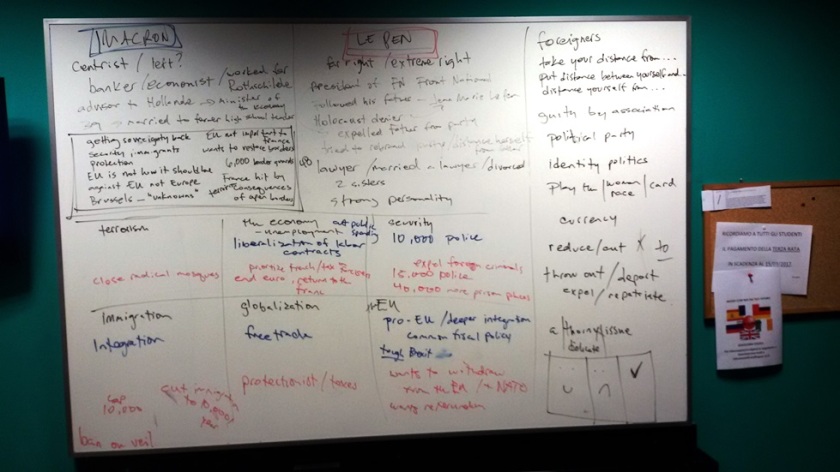
This group of 11 students did research on the topic by choosing from among the resources I had selected for them or finding their own. Some did look elsewhere — particularly one student who found that the Guardian articles were too obviously slanted toward Macron, and so found a number of articles critical of him.
In class, they shared:
- What they had learned about each candidate’s history and personal life, including the stories about Macron’s wife and Le Pen’s family history re the Front National. Students were in small groups, they reported the info to me and I boarded it. Then we had a whole-class discussion about the extent to which these things (apart from the issues) could/should influence your choice. We also discussed (at my provocation) why there was little talk of Le Pen possibly being the first woman president and whether a victory for Le Pen would be a victory for women. The class said she was not a woman candidate in the sense that she didn’t make women’s issues a part of her campaign.
- The 6 biggest issues for the election (according to them: the EU, the economy, terrorism, immigration, security)Again, they shared info in groups then reported to me. I then had the students rank the issues 1-6 in order of importance. As usual, group ranking activities are brilliant for generating discussion in small groups.
- We did the BBC listening activity — but we were out of time before we could continue with much discussion.
- Homework. Here’s a writing task I created with a significant excerpt from the brilliant “Undecided”, a New Yorker article by writer David Sedaris that is no less relevant despite being written about the 2008 US election:
You see this article in a newspaper regarding the upcoming election:
I don’t know that it was always this way, but, for as long as I can remember, just as we move into the final weeks of the Presidential campaign the focus shifts to the undecided voters. “Who are they?” the news anchors ask. “And how might they determine the outcome of this election?”
Then you’ll see this man or woman — someone, I always think, who looks very happy to be on TV. “Well, Charlie,” they say, “I’ve gone back and forth on the issues and whatnot, but I just can’t seem to make up my mind!” Some insist that there’s very little difference between candidate A and candidate B. Others claim that they’re with A on defense and health care but are leaning toward B when it comes to the economy.
I look at these people and can’t quite believe that they exist. Are they professional actors? I wonder. Or are they simply laymen who want a lot of attention?
To put them in perspective, I think of being on an airplane. The flight attendant comes down the aisle with her food cart and, eventually, parks it beside my seat. “Can I interest you in the chicken?” she asks. “Or would you prefer the platter of shit with bits of broken glass in it?”
To be undecided in this election is like pausing for a moment to ask the flight attendant how the chicken is cooked.
I mean, really, what’s to be confused about?
Write your letter to the editor saying whether you agree with the writer and his understanding of this election ― or his assessment of politics in general. You may refer to other elections than just the French one.
I’m waiting for their letters.
Student Feedback
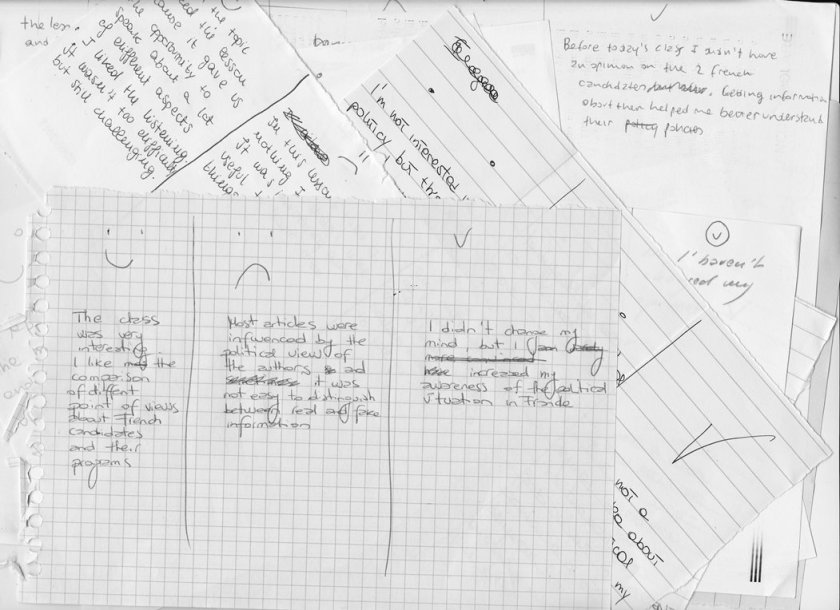
I wanted some feedback so I asked students 3 questions: what they liked, what they would change, and (for my own curiosity — this was not a goal of mine) whether reading about the candidates changed their mind about the election, the issues, the candidates. The responses:
What did you like about the lesson?
- I appreciated sharing opinions. I went into deep about my information about candidates of French elections.
- The subject was interesting and the dialogue was open.
- I found it useful.
- The lesson was very open-minded and “informative”. I liked the fact that we discussed a lot and we shared our ideas on very hot topics.
- I appreciate the material given and the structure of the lesson to focus on topics and go deeper on them.
- I liked the lesson and the fact that everybody has given his answer.
- I liked the topic. I liked the lesson because it gave us the opportunity to speak about a lot of different aspects. I liked the listening. The lesson was involving and useful to learn new things.
- The class was interesting. I like the comparison of different points of view about French candidates and their programs.
- I liked the topic and the fact that I learnt new words and expressions. I liked also the discussion part.
What did you not like/would you change about the lesson?
- It would have been interesting to know the opinion of the others. What would they have chosen?
- I felt uncomfortable discussing in my group about some issues (as immigration) because we had different point of views and with not enough time to explain well, not in our own language.
- Most articles were influenced by the political views of the authors and it was not easy to distinguish between real and false information.
- We talked about politics and I don’t actually have a clear idea about that but that’s on me.
Did you change your opinion about either candidate?
- I confirm my opinion of the candidate I prefer.
- I didn’t change my mind, but I did increase my awareness about the political situation in France.
- I learned more about the candidates but I didn’t change my mind.
- They confirmed my opinion about both of them but I wouldn’t know who to vote for.
- Comparing my ideas to the ones of my classmates helped me to have a wider view about the topic. I didn’t change my mind but I always appreciate to listen to different opinions.
- Before today’s class I didn’t have an opinion on the 2 French candidates. Getting information about them helped me better understand their politics.
- Before this homework I wasn’t really informed on the French political situation. This topic and the way to explore it (videos, reading) has been very useful for me, more than other topics (like cinema, arts…)
- I didn’t change much my opinion because I wasn’t very informed before, anyway my research strongly confirmed my previous opinion.
- No, I haven’t changed my opinion.
Summary:
We spent a lot of time compiling information based on their reading, which meant there wasn’t a lot of time (after the listening) for whole class discussion at the end. This is one of the perils of “issues” topics that get beyond the individual — you want to give everyone the opportunity to get informed and support their ideas with information. But I did almost feel like sharing information was almost a way of avoiding debating some of the issues.
Interestingly, one student said they didn’t know what the group members really thought, but would have liked to; another said they felt uncomfortable sharing their personal opinion in the group. But these two were the only two to make comments like that — most seemed to think they successfully shared opinions and ideas with the group.
Everybody was positive about having investigated the topic and informed themselves about this political issue, with one student even praising this topic above other more conventional ones (that we have addressed) including cinema and the arts.
Upper-Intermediate
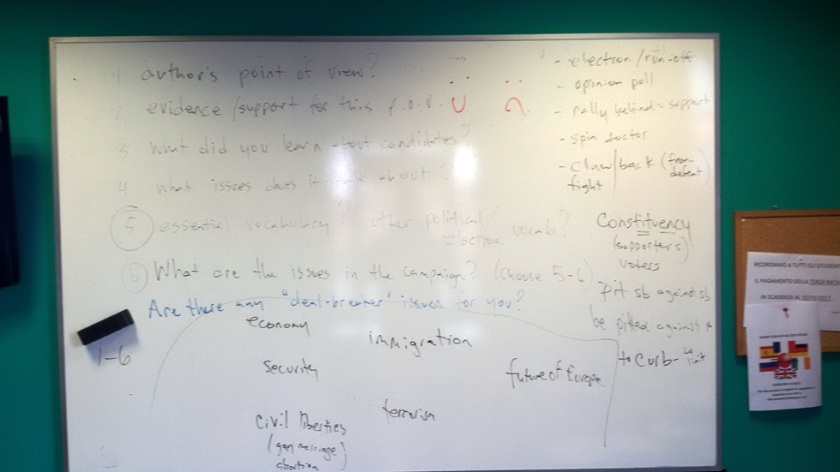
In this class with 13 students we talked about the election on two different Saturdays, dedicating about 45 minutes – 1 hour each time.
In the first class the students:
- Used the phones to check the Guardian article summarizing the two candidates. One group researched Le Pen, the other Macron. Then paired up with a student from the opposite group and shared what they had learned. We boarded the issues and each candidate’s stand on them, and the students shared their opinions about the issues.
- For homework they had to choose one article to read from the Guardian’s coverage of the election and consider:
- What is the author’s point of view? Why?
- What evidence/information does the author use to support this point of view?
- What more do you learn about the candidates?
- What is essential vocabulary for understanding the article?
- What is other vocabulary related to politics/elections?\
In the second class, the students compared their articles in small groups, shared vocabulary, etc. and then ranked the issues in order of importance, then discussed who they would vote for given the chance. I visited all the groups to monitor and answer questions but we didn’t have time for whole-class discussion.
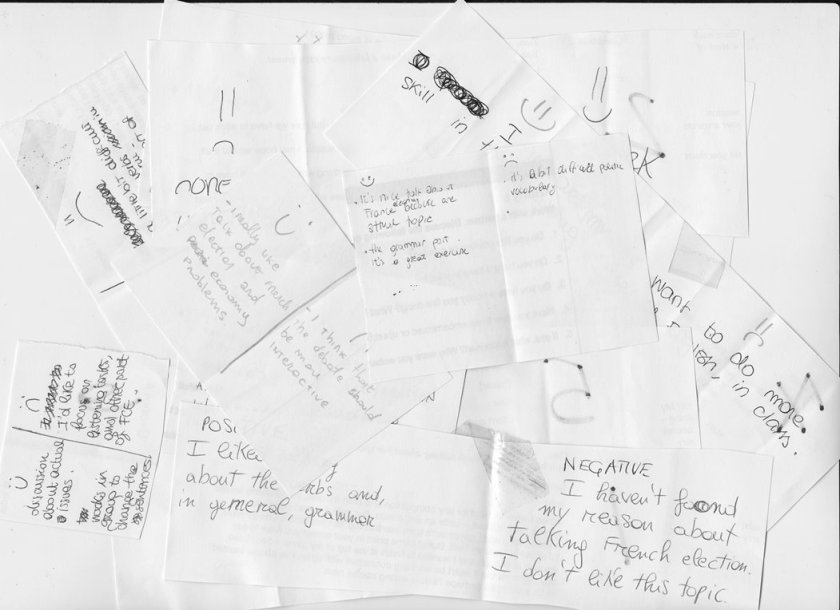
The feedback was simpler — we were out of time, so it had to be quick. But I’ll summarize a few relevant comments:
What I liked about the class:
Three students were happy to talk about the election because it was an “actual topic”, i.e. current/relevant and about “what’s happening these days”. Another liked learning something about the French election. Still another said they liked talking about the “French election and economy problems”.
What I didn’t like
There were few negative comments. One stated that the political vocabulary was difficult. Only one student said flat-out “I don’t like this topic”.
Summary
One of the challenges of the topic at this level was the vocabulary level related to using authentic materials — particularly as most had chosen opinion pieces from the Guardian’s Comment is Free section, where the challenge is even higher. I saw from their printed articles that they had done a lot of language work. But the discussion demonstrated that they could use a lot of the language in the context of their discussion.
Interestingly, the one repeated comment I did get in the “what I would change” section was requests for more Use of English, more Exam writing, more other exam-related things. This is an B2/FCE prep-class, and we use have a coursebook (which I mostly use to give them exam-task homework). This late in the course, deviation from exam prep may have seemed an unnecessary diversion to some. The takeaway for me is that if I’m going to do something like this at this point I should link it to some exam-like task. It’s something I do with the Advanced group, but didn’t think to do here because they have so many other explicit exam tasks to practice on.
Teens Upper-Intermediate/Advanced
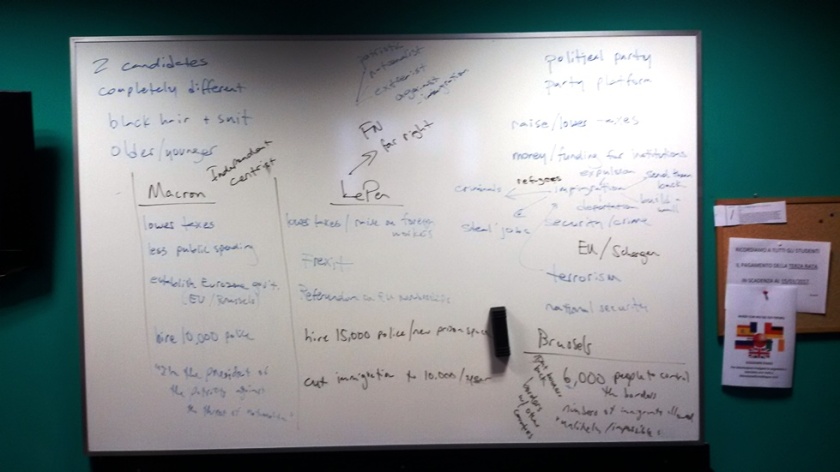
We spent one class period on the topic, with no out-of-class work. There were only 2 girls in class, and they started with almost no knowledge of the actual candidates (they didn’t realize that one was a woman). However, as we’ve used authentic materials, some of which they’ve chosen, throughout the year, and they themselves had in the past selected topics like the gender pay gap and gender inequality to discuss in class, I had little doubt they would be capable of and interested in learning about and discussing the topic.
After they made predictions about the candidates and the issues, they accessed the Guardian article on their phones and each researched a candidate and then shared their information and opinions.
They’re quick to pick up on and use new vocabulary and they picked up on the use of “patriotic” in reference to both candidates in the brief video. This led to a lengthy discussion on patriotism vs. nationalism, with the students writing and comparing their own definitions of each, and questioning about who “owned” each — the right or the left.
Conclusion
As I’ve argued previously, I think it is important, as Linda Ruas said, to let the world into the classroom. Talking about issues like these gives students the opportunity to learn and practice the kind of vocabulary that fills the front pages of newspapers but which they never have access to in the EFL classroom. It also gives them the chance to practice exchanging views on topics that are immensely relevant to their lives, even if not usually viewed as such by the ELT publishing houses.
I didn’t have any (as JJ Wilson would call it) “proselytizing” goal with these topics — I wasn’t interested in proving to these students which candidate was better. So much so, in fact, that perhaps we erred too much on the side of caution — there were no real arguments about which candidate had the superior worldview, even though maybe part of me did want to challenge, more than we did, some voices in favor of who I viewed as the much worse choice between the two candidates (What would Steve Brown do? I found myself wondering a few times). Of course it might have been easier because we were talking about the French election and not that of Italy. But that’s also due to the students. They were cautious when they needed to be, and didn’t seek to offend.
But I think what really made this work was that the students (in most cases) had to opportunity to get informed before class so that they could discuss and use the relevant language that they’d discovered. They also had enough questions and tasks to keep the conversation and sharing fairly self-sustaining.
With the right tasks and the right approach, it becomes a simple choice: do I talk about hobbies or do I talk about politics? They’re both topics described in language that can be examined, practiced, corrected and tested. They’re both made of language, and you can choose what to do with it. No less than hobbies or any other run-of-the-mill topic, the French election can provide the material for language study and development.
Now, did I change anybody’s mind about the election? The answer, based on one class’s feedback, was a resounding No. But that was never the point.
What I hope I might have changed some minds about, for you and my students, is that topics like this — or whichever ones you or your students choose — do have a place in the ELT classroom.

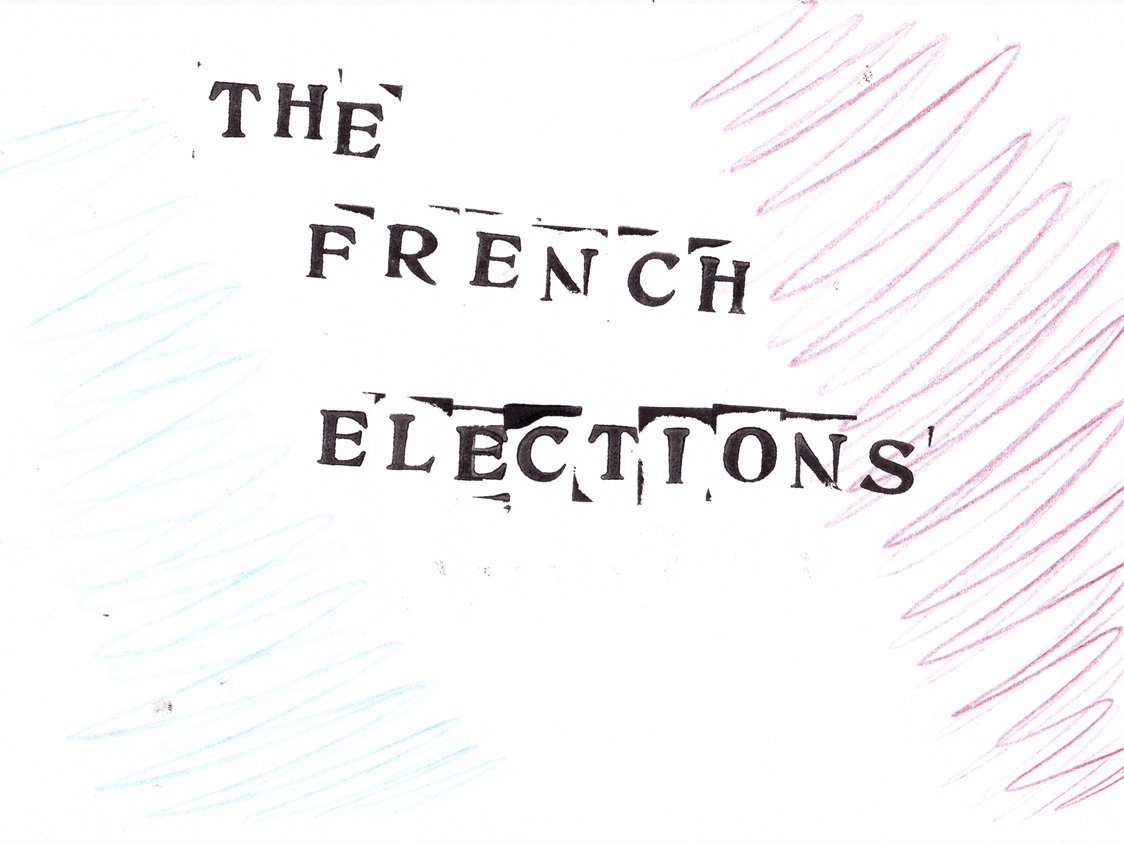
Thank you Kyle, this was very interesting to read and you spent a lot of time on this. My intermediate adult students are interested in topics like this, but I do not find myself capable of delivering lesson plans like this. I wish I were.
LikeLike
Thanks for commenting, Lenka. Time is a big issue, particularly with a lesson like this because I won’t be able to reuse it again (the election’s over). That said, the listening activity (from the BBC) took me about an hour to transcribe and create, and I did use it for 3 different classes. But because topics like this have an expiration date, for current-events stuff like this I try not to spend too much time making the perfect text-based activity; instead I give students some options to choose from and focus more on vocabulary (that they find) and discussion. Maybe you could try just starting with a selection of a few not-too-difficult articles on a specific current events topic and let your students choose which one to read and come in to discuss. I always think it works best if you give them a few tasks like “write down 10 topic-related vocab words” or “write 5 questions to ask the others about this topic” to do before they come in. Let me know if you give it a try!
LikeLike